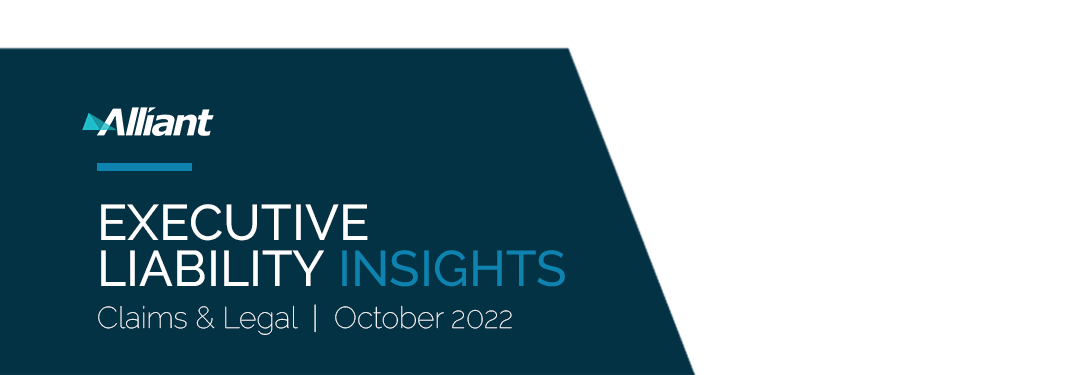
Navigating today’s complex risk environment can be a monumental task. Steve Shappell, Alliant Claims & Legal, spearheads Executive Liability Insights, a monthly review of news, legal developments and information on executive liability, cyber risk, employment practices liability, class action trends and more.

FEATURED ARTICLE
INSUREDS HAD DUTY TO DISCLOSE ONGOING SEC INQUIRY IN WARRANTY LETTER
Infinity Q Cap. Mgmt., et al. v. Travelers Cas. & Sur. Co., et al., No. N21C-07-158 EMD CCLD (Del. Super. Ct., Aug. 15, 2022)
This coverage dispute arose after an insured investment advisor sought an advancement of defense costs under its excess professional liability policy for a claim that was directly related to a prior U.S. Securities and Exchange Commission (“SEC”) inquiry.
In This Issue:
INSUREDS HAD DUTY TO DISCLOSE ONGOING SEC INQUIRY IN WARRANTY LETTER
Infinity Q Cap. Mgmt., et al. v. Travelers Cas. & Sur. Co., et al., No. N21C-07-158 EMD CCLD (Del. Super. Ct., Aug. 15, 2022)
This coverage dispute arose after an insured investment advisor sought an advancement of defense costs under its excess professional liability policy for a claim that was directly related to a prior U.S. Securities and Exchange Commission (“SEC”) inquiry.
Read More >>
WHAT DOES "CORRELATED" MEAN? THIS COURT PULLED OUT ITS DICTIONARY TO EXPLAIN
Datamaxx Applied Techs., Inc. v. Brown & Brown, Inc., No. 21-13451 (11th Cir. Aug. 23, 2022)
The Eleventh Circuit Court of Appeals recently held that under a claims-made policy, an insurer had no obligation to indemnify a technology company for repeatedly undermining a licensing agreement with its business partners.
Read More >>
OKLAHOMA FEDERAL COURT SAYS INSURER MUST SHOW PREJUDICE UNDER CLAIMS-MADE POLICY
General Star Indem. Co. v. Guthrie, No. 19-cv-314-JWB (E.D. Okla. Sept. 2, 2022)
An Oklahoma federal court recently held that an insurer must show prejudice to deny coverage for late notice under a claims-made policy where notice of a claim was untimely under the policy’s reporting window, yet within the policy period.
Read More >>
COURT RULES IN FAVOR OF D&O POLICYHOLDER SEEKING COVERAGE FOR RELATED ANTITRUST SUITS
Duke Univ. v. Endurance Risk Sols. Assurance Co., No. 5:20-CV-672-BO (E.D.N.C. Aug. 23, 2022)
In the original underlying class action, a group of professors filed an antitrust lawsuit against a university alleging collusion around an anti-poaching agreement. The university tendered the suit to its directors and officers liability (“D&O”) tower of insurance, and later settled the claim. Payments were made by the primary and all excess D&O insurers, except for the top layer, which was not reached.
Read More >>
CGL POLICY CANNOT COMPENSATE FOR ADSENSE OF D&O COVERAGE
Discover Prop. & Cas. Ins. Co. et al v. Blue Bell Creameries USA, Inc. et al, 1:21-CV-487-RP (W.D. Tex. Aug. 22, 2022)
A listeria outbreak claimed the lives of three people, sickened ten others, and led to a widespread recall of an ice cream manufacturers' goods. As a result, a shareholder of the manufacturer filed a derivative lawsuit against the manufacturer’s officers and directors, alleging they knowingly disregarded the listeria risk, despite receiving repeated and ongoing positive presumptive test results for the bacteria, which led to tens of millions of dollars in losses.
Read More >>
INSIDER-TRADING ALLEGATIONS FALL WITHIN D&O POLICY'S DEFINITION OF 'SECURITIES CLAIM'
Valeant Pharms. Int'l, Inc. v. AIG Ins. Co. of Can., No. 18-493 (D.N.J. Sept. 6, 2022)
The underlying litigation arose when an insured pharmaceutical company (the “insured”) attempted to acquire another pharmaceutical company (the “target”). The insured entered into an agreement with a hedge fund to help it secure a large enough stake in the target to facilitate a vote in favor of the acquisition.
Read More >>
DELAWARE COURT RULES DO POLICY COVERS CHOCOLATIER IN DISPUTE OVER FALSE LABEL
G-New Inc. dba Godiva Chocolatier Inc. v. Endurance Am. Ins. Co., et al., No. N21C-10-100 (Del. Supr. Sept. 12, 2022)
In the underlying litigation, an insured chocolate maker was sued in a consolidated class action alleging its product labels were misleading and violated consumer protection statutes. The parties went to mediation and ultimately settled.
Read More >>
FAILURE TO PREVENT A CYBER-HACK NOT A BREACH OF OVERSIGHT DUTY
Construction Indus. Laborers Pension Fund on behalf of SolarWinds Corp. v. Bingle, et al., No. 2021-0494-SG (Del. Ch. Sept. 6, 2022)
In a recent case, directors of a software development corporation won a derivative claim alleging they failed to oversee a monitoring system and duly manage cybersecurity risk. As a software developer that requires access to its clients’ IT systems and serves as an attractive target for cyber-attacks, the corporation had a significant loss in stock after announcing that Russian hackers compromised the data of almost 18,000 of its clients.
Read More >>
CYBER CORNER
Click to read the following cases:
- EMPLOYEES HAVE STANDING TO BRING CLASS ACTION COMPLAINT FOLLOWING DATA BREACH
- CALIFORNIA AG ENTERS FIRST EVER SETTLEMENT OF CCPA ENFORCEMENT ACTION
- NO COVERAGE FOR FRAUDULENT WIRE PAYMENT UNDER CYBER POLICY
Read More >>
EPL CORNER
Click to read the following cases:
- NO COVERAGE FOR BIPA SUIT UNDER EPL POLICY
Read More >>
SEC CORNER
Click to view the following cases:
- FINANCIAL SERVICES COMPANY SETTLES WITH THE SEC FOR FAILING TO PROTECT CUSTOMER PII
- SEC ADOPTS TWO AMENDMENTS TO WHISTLEBLOWER PROGRAM
- AIRCRAFT MANUFACTURER AND EX-CEO SETTLE WITH SEC FOR FRAUD CONSPIRACY
- SEC SEEKS ADDITIONAL REGULATION THROUGH ENFORCEMENT POWER
- CEO AND FORMER PRESIDENT OF MOBILE APP COMPANY CHARGED BY SEC FOR INSIDER TRADING
- SEPTEMBER 2022 NOTEWORTHY ENFORCEMENT ACTIONS FILED
- SEPTEMBER 2022 NOTEWORTHY SETTLEMENTS AND JUDGMENTS
Read More >>
SHAREHOLDER CORNER
Click to view:
- SEPTEMBER 2022 SECURITIES CLASS ACTION FILINGS
- SEPTEMBER 2022 M&A-RELATED SECURITIES CLASS ACTION FILINGS
Read More >>
INSUREDS HAD DUTY TO DISCLOSE ONGOING SEC INQUIRY IN WARRANTY LETTER
Infinity Q Cap. Mgmt., et al. v. Travelers Cas. & Sur. Co., et al., No. N21C-07-158 EMD CCLD (Del. Super. Ct., Aug. 15, 2022)
This coverage dispute arose after an insured investment advisor sought an advancement of defense costs under its excess professional liability policy for a claim that was directly related to a prior U.S. Securities and Exchange Commission (“SEC”) inquiry. Relying upon the prior knowledge exclusion in a warranty letter the investment advisor had furnished at the time the policy was bound, the excess insurer denied coverage and litigation ensued.

When the investment adviser purchased the excess coverage, it provided the insurer with a warranty letter in which it represented that “[n]o person or entity for whom this insurance is intended has any knowledge or information of any act, error, omission, fact or circumstance that may give rise to a claim.” The insurer argued that the representations and warranties contained in the letter had been breached, and as such, the investment advisor was not entitled to an advancement of defense costs under the policy.
Siding with the excess insurer, a Delaware judge found that because the advisor failed to disclose the initial SEC inquiry when the excess policy was bound, the insurer was permitted to deny coverage. In so finding, the court reasoned that “any knowledge or information that may give rise to a claim is sufficient to exclude the insureds from coverage.” Prior to binding the coverage, multiple executives of the insured knew they “were the subject of the SEC’s ongoing inquiry,” the court noted. Yet despite having prior knowledge, the insured completed the warranty letter without disclosing the SEC’s ongoing inquiry. The court concluded that such “matters are barred from coverage as a matter of law” under the prior knowledge exclusion.
The Takeaway
Warranty letters are commonly requested by underwriters when insureds are purchasing additional limits or new layers of insurance. This case highlights the significant impact a warranty letter can have when a claim arises at a later date. Insurers will carefully review the letter’s content and surrounding facts at the time of the claim. Thus, insureds need to be transparent in their disclosures in order to safeguard against potential denials in coverage or even rescission of the policy in its entirety.
WHAT DOES “CORRELATED” MEAN? THIS COURT PULLED OUT ITS DICTIONARY TO EXPLAIN
Datamaxx Applied Techs., Inc. v. Brown & Brown, Inc., No. 21-13451 (11th Cir. Aug. 23, 2022)
The Eleventh Circuit Court of Appeals recently held that under a claims-made policy, an insurer had no obligation to indemnify a technology company for repeatedly undermining a licensing agreement with its business partners.

As covered in the October 2021 edition of Executive Liability Insights, the underlying suits arose after the technology company entered into a licensing agreement where it agreed to use the claimant’s patented code to manufacture and sell a jointly-developed product. The claimant later sued the technology company for violating the agreement, alleging the company used the code to develop its own competitive product, then failed to properly brand the new product as using the claimant’s technology or pay the claimant for its use. The parties settled the litigation, but the claimant sued the technology company a second time, alleging the company once again breached the terms of the licensing agreement as well as the settlement agreement by creating and marketing a new product with indistinguishable functions.
After settling the second litigation, the technology company sought coverage for the settlement from its insurer. The insurer, however, denied coverage on the grounds that the second lawsuit related back to the first suit and was therefore not a claim first made during the policy period under which it was noticed. Under the policy, coverage did not apply to loss “in connection with an act, if such act also correlates with any claim deemed to have been made before the beginning of the policy period.” The policy defined “act” to include “all correlated acts, errors or omissions and all series of continuous or repeated acts, errors or omissions.”
In finding in favor of the insurer, the Eleventh Circuit focused on the facts common to the two underlying lawsuits. Although the policy did not define “correlation,” the court explained that mere failure to provide a definition does not render a term ambiguous. After reviewing some dictionary definitions, the court determined that correlation does not necessarily imply causation. Instead, correlation takes “nothing more than a showing that acts and claims 'tend to vary, be associated, or occur together in a way not expected on the basis of chance alone.'” Because the insurer was able to establish that the technology company had displayed a pattern of repeated misconduct toward its business partners, the court determined that the second suit related back to the first and was thus excluded under the policy.
The Takeaway
Interrelatedness is not especially difficult for insurers to establish. Even the rules of construction, which demand that ambiguous terms be interpreted to the insured's advantage, are insufficient to circumvent the plain meaning of terms and extend coverage where the policy intends to exclude it. As such, timely and accurate noticing of claims under claims-made policies is vital to securing coverage and avoiding litigation.
OKLAHOMA FEDERAL COURT SAYS INSURER MUST SHOW PREJUDICE UNDER CLAIMS-MADE POLICY
General Star Indem. Co. v. Guthrie, No. 19-cv-314-JWB (E.D. Okla. Sept. 2, 2022)
An Oklahoma federal court recently held that an insurer must show prejudice to deny coverage for late notice under a claims-made policy where notice of a claim was untimely under the policy’s reporting window, yet within the policy period.

A physician purchased a claims-made-and-reported professional liability insurance policy. The policy’s notice provision required that if a claim was made, the insured must “deliver to the Company within ten (10) days after the date of receipt of the claim or potential claim, every demand, notice, summons, notice of intent to sue, complaint” or “any document the insured or the insured’s representative receives relating to a claim.” The policy also contained a section entitled “What to do in case of a claim,” which instructed the insured to “immediately, however no later than within ten (10) days, report the details to either your agent/broker” or to the insurance company.
Thereafter, the physician was sued by the administrator of a patient’s estate after the patient passed away. The physician notified his insurance broker of the lawsuit via telephone and provided a copy of the summons and complaint one week later with instructions to notify the insurer. The insurer received notice of the suit from the physician’s broker approximately six weeks after the physician first received notice of the suit, i.e., more than ten days after the claim was made but within the policy period. The insurer denied coverage and sought a declaration that is owed no duty under the policy.
Although the court found that the suit met the definition of claim under the policy, it further found that the policy was ambiguous as to how the insured was supposed to provide notice. Regardless, the court concluded the insured failed to give timely notice because such notice fell outside of the ten-day notice window, and next sought to determine whether Oklahoma’s “notice-prejudice rule” was applicable to a claims-made-and-reported policy. Although the court noted that a showing of prejudice is not required to deny coverage under a typical claims-made policy, the court further noted that Oklahoma courts had not addressed claims-made policies with ten-day reporting windows. Furthermore, the court noted that other jurisdictions have held that an insurer must prove prejudice when an insured notifies it of a claim within the policy period but fails to provide notice within the time specified in the notice provision. Accordingly, the court determined that Oklahoma would similarly conclude that an insurer must show prejudice to deny coverage on a claims-made policy when notice was untimely under the reporting window but made within the policy period.
COURT RULES IN FAVOR OF D&O POLICYHOLDER SEEKING COVERAGE FOR RELATED ANTITRUST SUITS
Duke Univ. v. Endurance Risk Sols. Assurance Co., No. 5:20-CV-672-BO (E.D.N.C. Aug. 23, 2022)
In the original underlying class action, a group of professors filed an antitrust lawsuit against a university alleging collusion around an anti-poaching agreement. The university tendered the suit to its directors and officers liability (“D&O”) tower of insurance, and later settled the claim. Payments were made by the primary and all excess D&O insurers, except for the top layer, which was not reached.

Approximately a year after the settlement, a second action was filed. The university sought coverage from the remaining excess insurer, which denied coverage on the grounds that the alleged “Wrongful Acts” in the new action occurred prior to the retroactive date in its policy. The insurer also contended that the underlying limits had not been properly exhausted by payment of covered “Loss.”
Coverage litigation ensued and the court looked to the terms of the primary D&O policy, which stated “all Claims arising out of the same Wrongful Act and all Interrelated Wrongful Acts shall be deemed to constitute a single Claim and shall be deemed to have been made at the time at which the earliest Claim is first made.” Despite being filed years apart and the existence of a class-wide settlement, the court held the second action was interrelated to the earlier suit. Next the court rejected the excess insurer’s “improper exhaustion” argument, noting that “an excess insurer may not challenge the underlying insurers’ payment decisions in order to argue that their policy limits were not (or should not have been) exhausted … unless there is an indication that the payments were motivated by fraud or bad faith.” Finally, the court ruled that the retroactive date exclusion was inapplicable because the second suit only contained allegations of “Wrongful Acts” occurring after the retroactive date.
The Takeaway
While this was a favorable result for the policyholder, the court’s determination of relatedness between two actions filed years apart and following the approval of a class settlement is concerning. Such outcomes can be avoided with more explicit wording. Additionally, absent evidence of fraud or bad faith, an excess insurer is unable to challenge the propriety of payments made by underlying insurers.
CGL POLICY CANNOT COMPENSATE FOR ABSENCE OF D&O COVERAGE
Discover Prop. & Cas. Ins. Co. et al v. Blue Bell Creameries USA, Inc. et al, 1:21-CV-487-RP (W.D. Tex. Aug. 22, 2022)
A listeria outbreak claimed the lives of three people, sickened ten others, and led to a widespread recall of an ice cream manufacturers' goods. As a result, a shareholder of the manufacturer filed a derivative lawsuit against the manufacturer’s officers and directors, alleging they knowingly disregarded the listeria risk, despite receiving repeated and ongoing positive presumptive test results for the bacteria, which led to tens of millions of dollars in losses.

With no directors and officers Liability (“D&O”) insurance to cover the matter, the manufacturer sought relief from its commercial general liability (“CGL”) policy, arguing the directors were “insureds” with respect to their duties. The CGL insurer denied coverage, and litigation ensued.
Ruling in favor of the insurer, the court first noted the manufacturer could not argue that its directors were discharging their duties while simultaneously alleging (in the derivative suit) that they had breached those duties. The court was also unpersuaded by the manufacturer’s argument that the directors’ actions lacked intent to cause harm, finding the losses were a natural and probable consequence of their actions. Finally, the court concluded that a CGL policy is not designed to reimburse shareholders for cases brought by its customers, even those involving bodily injury.
The Takeaway
CGL policies cannot compensate a corporation for the absence of D&O coverage. Both privately and publicly held corporations should secure sufficient D&O coverage and not rely upon creative legal reasoning in the hope of triggering coverage under other policies.
INSIDER-TRADING ALLEGATIONS FALL WITHIN D&O POLICY’S DEFINITION OF ‘SECURITIES CLAIM’
Valeant Pharms. Int'l, Inc. v. AIG Ins. Co. of Can., No. 18-493 (D.N.J. Sept. 6, 2022)
The underlying litigation arose when an insured pharmaceutical company (the “insured”) attempted to acquire another pharmaceutical company (the “target”). The insured entered into an agreement with a hedge fund to help it secure a large enough stake in the target to facilitate a vote in favor of the acquisition.

In exchange, the hedge fund would take control of the target’s board of directors and sell its shares at a profit upon disclosure of the acquisition bid. The hedge fund further agreed to split the profits on such sales with the insured. The insured then made a tender offer to the target’s shareholders, including a combination of cash and the insured’s stock in exchange for the target’s stock. When the acquisition ultimately failed, shareholders of the target filed a class action complaint against the insured, alleging insider trading and securities fraud in connection with its attempted hostile takeover.
The insured tendered the complaint to its directors and officers liability (“D&O”) insurers, but coverage was denied on the grounds that the shareholders’ allegations did not meet the policy’s definition of “Securities Claim.” Under the D&O policy, “Securities Claim” was defined, in part, as a “Claim” “alleging a violation of any law, rule or regulation, whether statutory or common law (including but not limited to the purchase or sale or offer or solicitation of an offer to purchase or sell securities), which is: brought by any person or entity alleging, arising out of, based upon or attributable to the purchase or sale or offer or solicitation of an offer to purchase or sell any securities of an Organization.”
Ruling for the insured, the court adopted a broad reading of the policy’s coverage grant in what it called “a straightforward application of unambiguous contract terms.” The court found that the underlying suit fell squarely within the definition of “Securities Claims” because it “alleg[ed], ar[ose] out of, [was] based upon or [was] attributable to … an offer to sell [the insured’s] securities.” Moreover, the court rejected the insurer’s argument that the “exchange offer was really an offer to purchase the [target’s] securities, not one to sell [the insured’s] shares.” According to the court, the insured acted as both purchaser and seller because the exchange offer “involved two components, first the sale of [the insured’s] shares to [target] shareholders and second the purchase of [target] shares.”
DELAWARE COURT RULES D&O POLICY COVERS CHOCOLATIER IN DISPUTE OVER FALSE LABEL
G-New Inc. dba Godiva Chocolatier Inc. v. Endurance Am. Ins. Co., et al., No. N21C-10-100 (Del. Supr. Sept. 12, 2022)
In the underlying litigation, an insured chocolate maker was sued in a consolidated class action alleging its product labels were misleading and violated consumer protection statutes. The parties went to mediation and ultimately settled.

The suit was tendered under the chocolate maker’s private company directors and officers liability (“D&O”) program, but the insurers denied coverage, claiming there was no “loss” under the policy because the Chocolate maker’s actions in the underlying suit were intentional. Moreover, the insurers asserted that exclusions for unfair trade practices and fines imposed by law further precluded coverage.
The insured initiated coverage litigation in an attempt to recoup millions of dollars in defense costs from its insurers, arguing the policy language was sufficiently broad to cover both intentional and unintentional acts and the settlement amount was meant to compensate the plaintiffs, not punish the chocolate maker. Siding with the insured, the court found the settlement qualified as a covered loss, noting the insurers failed to prove “some evidence or admission that the violation of law was knowing or willful,” and the policy language contemplated settlements as covered losses. Although the insurers argued the allegedly mislabeled products were of a deceptive nature “resulting in … ‘ill-gotten gains,’” the court again sided with the insured because the insurers failed produce any authoritative source that concluded “unfair trade practices [were] the equivalent of consumer fraud.” Finally, the court agreed with the insured’s assertion that the settlement served as a compensation to the plaintiffs in the underlying suit, not as a punishment for default, and thus did not constitute a fine or penalty imposed by law.
FAILURE TO PREVENT A CYBER-HACK NOT A BREACH OF OVERSIGHT DUTY
Construction Indus. Laborers Pension Fund on behalf of SolarWinds Corp. v. Bingle, et al., No. 2021-0494-SG (Del. Ch. Sept. 6, 2022)
In a recent case, directors of a software development corporation won a derivative claim alleging they failed to oversee a monitoring system and duly manage cybersecurity risk. As a software developer that requires access to its clients’ IT systems and serves as an attractive target for cyber-attacks, the corporation had a significant loss in stock after announcing that Russian hackers compromised the data of almost 18,000 of its clients.

Before the attack, the board charged two committees with overseeing the company’s cybersecurity risks. Nevertheless, plaintiffs alleged the directors ignored red flags and “utterly failed to conduct any reasonable oversight concerning the company’s [mission-critical] cybersecurity risks.”
Oversight liability claims are frequent but challenging to prove—they require establishing a strong link between corporate trauma and the intentional actions or inactions of the board. Such connection typically calls for a claim that the board (i) violated positive law, (ii) intentionally acted contrary to the corporation’s best interest, or (iii) willfully abandoned their duties by failing to implement a monitoring system for such risks. In sum, the board’s ability to prevent corporate trauma is immaterial. Instead, the controlling aspect of a successful pleading in an oversight duty claim is the presence of the board’s bad faith in exercising those very duties. Accordingly, the court held that the plaintiffs failed to plead facts sufficient to demonstrate bad faith on the part of directors to support the failure of oversight claim because delegating oversight risk to a particular committee does not raise to the level of intentionality and bad faith.
The Takeaway
The growing number of once-rare derivative claims against directors for oversight failure, coupled with increased cybersecurity risks and the SEC’s proposed cybersecurity rules, carry some implications for D&O insurance underwriters: the higher risks of liability and the underwriting that accounts for board processes and reporting schemes require attention.
Cyber Corner
EMPLOYEES HAVE STANDING TO BRING CLASS ACTION COMPLAINT FOLLOWING DATA BREACH
Clemens v. ExecuPharm, No. 2-20-cv-03383 (3rd Cir. Sept. 2, 2022)
The Third Circuit Court of Appeals recently held that current and former employees of a pharmaceutical company whose employment information was published on the Dark Web following a data breach had standing to bring tort and contract claims in the form of a potential class action.
CALIFORNIA AG ENTERS FIRST EVER SETTLEMENT OF CCPA ENFORCEMENT ACTION
The California Attorney General recently resolved a case in which a beauty retailer allegedly violated the state’s “first-in-the-nation landmark privacy law.” The case was brought as part of what the Attorney General called “an enforcement sweeps of online retailers,” and alleged the company failed to disclose its practice of selling users’ personal information, failed to process user opt-out requests, and failed to cure these violations under the thirty-day time frame provided by the California Consumer Privacy Act (“CCPA”).
NO COVERAGE FOR FRAUDULENT WIRE PAYMENT UNDER CYBER POLICY
Star Title Partners of Palm Harbor LLC v. Illinois Union Ins. Co., No. 21-13343 (11th Cir. Sept. 6, 2022)
A title company was hired to close a residential real estate transaction. As part of their obligations, the title company divided the tasks among two representatives: a processer responsible for clearing the title for the property, and a closer responsible for distributing funds at closing.
Read More >>
NO COVERAGE FOR BIPA SUIT UNDER EPL POLICY
Church Mutual Ins. Co. v. Prairie Village Supportive, No. 21-C-3752 (N.D. Ill. Aug. 11, 2022)
In the underlying litigation, a former employee of an assisted living facility filed suit against the facility, alleging it had unlawfully collected, used, and disseminated biometric identifiers of its employees in violation of the Illinois Biometric Information Privacy Act (“BIPA”). The facility noticed the suit under its employment practices liability (“EPL”) coverage, but the insurer denied the claim, citing an exclusion for “Violations of Laws Applicable to Employers.”
SEC Corner
FINANCIAL SERVICES COMPANY SETTLES WITH THE SEC FOR FAILING TO PROTECT CUSTOMER PII
In a recent report, the U.S Securities and Exchange Commission (“SEC”) alleged that for several years, a financial services company failed to protect the personally identifiable information (“PII”) of millions of its customers. The company, without admitting or denying the findings, agreed to pay $35 million to the SEC to settle the charges.
SEC ADOPTS TWO AMENDMENTS TO WHISTLEBLOWER PROGRAM
The U.S. Securities and Exchange Commission (“SEC”) established its whistleblower program in 2010 to encourage individuals to report high-quality tips to help the agency detect wrongdoing and better protect investors and the marketplace. More recently, the SEC adopted two amendments to the rules governing its whistleblower program.
AIRCRAFT MANUFACTURER AND EX-CEO SETTLE WITH SEC FOR FRAUD CONSPIRACY
After two separate crashes of an aircraft manufacturer’s jets killed 346 people, the manufacturer rushed to reassure the public and its investors about the design and engineering of the aircraft and its compliance with safety regulations. In reality, however, faulty sensor readings in the jets’ Maneuvering Characteristics Augmentation System (“MCAS”)—an automated system intended to activate only in high-speed turns—inadvertently triggered the flight control system and pushed the planes into a nosedive.
SEC SEEKS ADDITIONAL REGULATION THROUGH ENFORCEMENT POWER
At the U.S. Security and Exchange Commission’s (“SEC”) latest conference, the agency advised they have adopted a “regulation by enforcement” agenda in an attempt to fill the gap between securities law and order. This newly adopted agenda will extend the SEC’s reach to include cryptocurrency and cybersecurity. These areas have garnered heightened focus from the SEC due to their increasing impact on investor confidence.
CEO AND FORMER PRESIDENT OF MOBILE APP COMPANY CHARGED BY SEC FOR INSIDER TRADING
A mobile app company based out of China was recently charged by the U.S. Securities and Exchange Commission (“SEC”) for insider trading. Rule 10b5-1 was adopted by the SEC in 2000 in order to provide companies, their directors and employees, and other corporate insiders with a potential affirmative defense to insider trading.
|
Director/Officer |
Role |
Company |
|
Kris A. Swaffer |
President |
POHIH, Inc. |
|
Sean K. Williams |
COO |
POHIH, Inc. |
|
Scott Lindell |
Chief Risk Officer, Chief Compliance Officer |
Infinity Q Capital Management LLC |
SEPTEMBER 2022 NOTEWORTHY SETTLEMENTS AND JUDGMENTS
|
Amount |
Director/Officer |
Role |
Company |
|
$ 728,171.00 |
Todd C. Doucette |
Vice President |
Align |
|
$ 150,000.00 |
Dan Oran |
CEO |
Profile Solutions, Inc. |
|
$ 50,000.00 |
James R. Thompson |
CEO |
Spyr, Inc. |
|
$ 75,000.00 |
Barry D. Loveless |
CFO |
Spyr, Inc. |
|
$ 10,000.00 |
James A. Mylock, Jr. |
Director |
Spyr, Inc. |
Source: U.S. Securities and Exchange Commission
Shareholder Corner
SEPTEMBER 2022 SECURITIES CLASS ACTION FILINGS
SEPTEMBER 2022 M&A-RELATED SECURITIES CLASS ACTION FILINGS
Source: Stanford Law School Securities Class Action Clearinghouse
ABOUT ALLIANT INSURANCE SERVICES
Alliant Insurance Services is the nation’s leading specialty broker. In the face of increasing complexity, our approach is simple: hire the best people and invest extensively in the industries and clients we serve. We operate through national platforms to all specialties. We draw upon our resources from across the country, regardless of where the resource is located.
Contributors

Abbe Darr, Esq.
Claims Attorney
abbe.darr@alliant.com
David Finz, Esq.
Claims Attorney
david.finz@alliant.com
Jacqueline Vinar, Esq.
Claims Attorney
jacqueline.vinar@alliant.com
Jaimi Berliner, Esq.
Claims Attorney
jaimi.berliner@alliant.com
Katherine Puthota
Senior Claims Advocate
katherine.puthota@alliant.com
Matia Marks, Esq.
Claims Attorney
matia.marks@alliant.com
Meaghan Fisher
Senior Claims Advocate
meaghan.fisher@alliant.com
Megan Padgett
Senior Claims Advocate
megan.padgett@alliant.com
Michael Radak
Claims Attorney
michael.radak@alliant.com
Robert Aratingi
Senior Claims Advocate
robert.aratingi@alliant.com
Robert Hershkowitz, Esq.
Claims Attorney
robert.hershkowitz@alliant.com
Steve Levine, Esq.
Claims Attorney
slevine@alliant.com